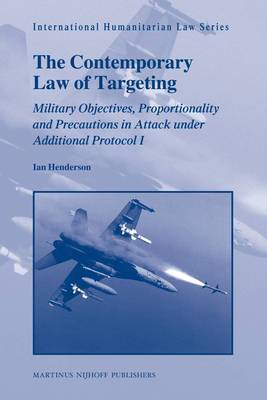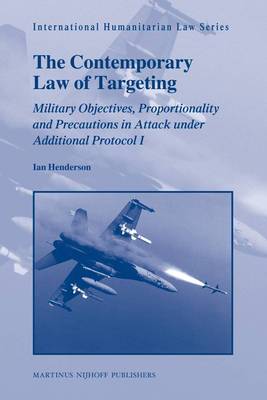
- Afhalen na 1 uur in een winkel met voorraad
- Gratis thuislevering in België vanaf € 30
- Ruim aanbod met 7 miljoen producten
- Afhalen na 1 uur in een winkel met voorraad
- Gratis thuislevering in België vanaf € 30
- Ruim aanbod met 7 miljoen producten
Zoeken
The Contemporary Law of Targeting
Military Objectives, Proportionality and Precautions in Attack Under Additional Protocol I
Ian Henderson
€ 244,45
+ 488 punten
Omschrijving
Armed conflict is about using force to achieve goals. As international humanitarian law regulates the means and methods that a belligerent may adopt to achieve its goals, there will inevitably be disagreements over the interpretation of that law. As for the rules that regulate targeting, the main difficulties arise over what is a lawful target and what is proportional collateral damage. This book provides a detailed analysis of those issues. Also, a chapter is dedicated to considering how United Nations Security Council sanctioning of participation in an armed conflict might affect the range of lawful targets available to a belligerent. Finally, a process is described by which legal responsibility for targeting decisions can be assessed in a complex decision-making environment.
Specificaties
Betrokkenen
- Auteur(s):
- Uitgeverij:
Inhoud
- Aantal bladzijden:
- 288
- Taal:
- Engels
- Reeks:
- Reeksnummer:
- nr. 25
Eigenschappen
- Productcode (EAN):
- 9789004174801
- Verschijningsdatum:
- 26/10/2009
- Uitvoering:
- Hardcover
- Formaat:
- Genaaid
- Afmetingen:
- 165 mm x 246 mm
- Gewicht:
- 612 g

Alleen bij Standaard Boekhandel
+ 488 punten op je klantenkaart van Standaard Boekhandel
Beoordelingen
We publiceren alleen reviews die voldoen aan de voorwaarden voor reviews. Bekijk onze voorwaarden voor reviews.








